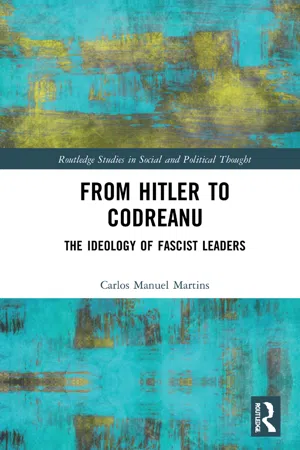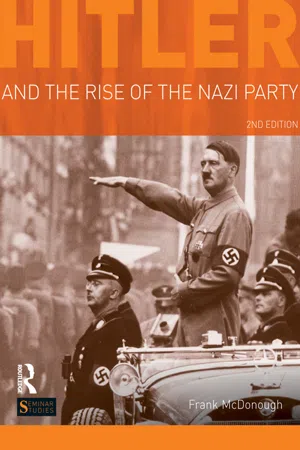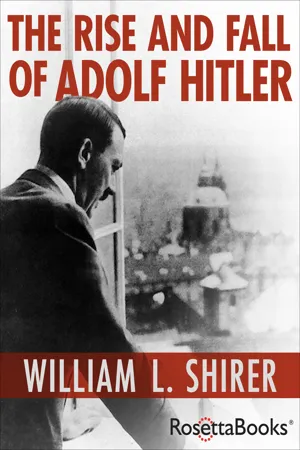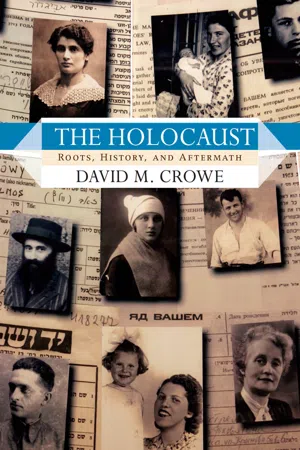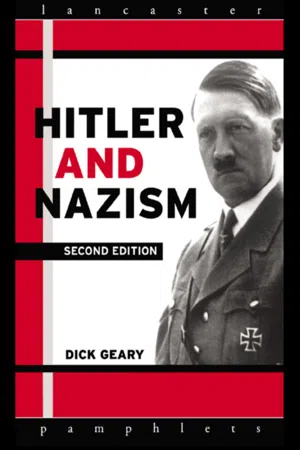History
Adolf Hitler
Written by Perlego with AI-assistance
Related key terms
1 of 5
8 Key excerpts on "Adolf Hitler"
- eBook - ePub
From Hitler to Codreanu
The Ideology of Fascist Leaders
- Carlos Manuel Martins(Author)
- 2020(Publication Date)
- Routledge(Publisher)
2 Adolf Hitler and German national socialism Racial struggle as the basis of a worldviewArguably the most (in)famous fascist leader who ever lived, Adolf Hitler owes his bad reputation to the visceral racial hatred which was at the core of his ideology and is (rightly so) repudiated in an almost universal way. Mainly due to the legacy of violence and cruelty of the Nazi Holocaust, many in the past, even in academic circles, have tried to approach Hitler by stressing the abhorrent features of his personality. However, we shall not be concerned with ‘psychotic’ or ‘psychopathic’ theories.1 We argue, therefore, that Hitler’s worldview (or weltanschauung, to employ the German word that he himself used) must be approached as any other ideological configuration, without this meaning that the researcher in any way approves or condones the content of his thought.2 This is the most effective way of approaching the ideas that, given the importance and charisma of this leader, were behind the practices of both the Nazi party and regime.Hitler and the Nazi party
Adolf Hitler was born in the Austrian town of Braunau am Inn on 20 April 1889 to a middle class family whose parental figure, Alois Hitler, was a civil servant in the Austro-Hungarian Empire. He spent a great part of his formative years in Linz and later moved to Vienne, hoping to succeed as a painter, even though he was rejected by the Academy of Fine Arts not much later. In 1913, Hitler moved to the German city of Munich and, at the beginning of World War I, enlisted in the Bavarian Army. When the world conflict was coming to an end, the future Nazi leader was hospitalised in the German town of Pasewalk after being blinded in battle. According to his own accounts, the surrender of Germany left him with the sense that an outrageous act of treason and cowardice had been committed, which exacerbated his nationalism and his desire for retribution. In the following year, after returning to Munich, Hitler was ordered by his army superiors to infiltrate a new nationalist political party by the name of German Workers’ Party (Deutsch Arbeiterpartei - eBook - ePub
Hitler and Nazi Germany
A History
- Jackson J. Spielvogel, David Redles(Authors)
- 2020(Publication Date)
- Routledge(Publisher)
5 The DictatorOne of the frequent debates in history is whether it is individuals, by the sheer strength of their personalities, or impersonal forces, be they economic, social, or political, that determine the course of history. In the last three chapters we have seen the important role of economic, social, and political factors in the rise of Adolf Hitler in Germany. But we have also witnessed the crucial role played by Hitler himself. The unknown soldier of World War I came to power in 1933 in a country in despair because of its political and social problems. Within five years Hitler had given many Germans new hope. They saluted him as their Führer, as a messiah who had lifted them out of the depression and renewed their prosperity. He had built magnificent highways and pledged that every laborer would own an automobile. He had provided a Strength Through Joy movement that became the symbol of a progressive social policy designed to benefit the workers. Moreover, as we will see in subsequent chapters, Hitler reversed the shame of the Treaty of Versailles, rearmed the nation, remilitarized the Rhineland, and created Greater Germany by annexing Austria and parts of Czechoslovakia.Nazi Germany is inexplicable without Adolf Hitler. What was the source of this man’s power to sway millions of people to follow him with passionate commitment, even to death? How could one man mobilize a nation raised on Luther, Bach, and Beethoven to conquer Europe and methodically eliminate its avowed enemies in gas chambers? An examination of Hitler’s personality, his messianic complex, his flair for oratory, his ideology, and his attempt to translate that ideology into reality through propaganda and mass spectacles should help answer these questions.Hitler’s Personality
Many who examine photos of Hitler today wonder how such a commonplace and in some ways comical-looking figure could have become the object of such mass hysterical adulation. Females especially swooned in his presence. Except for his pale blue eyes, which seemed to many to have a hypnotic effect, Hitler’s physical characteristics were in fact quite undistinguished. - eBook - ePub
- Frank McDonough(Author)
- 2014(Publication Date)
- Routledge(Publisher)
Lebensraum, the acquisition of living space, not only had historical precedents in German history, but was mentioned frequently in most of the pre-1914 Pan-German League pamphlets. German dominance of eastern Europe and the subordination of the Slavs were key aims, not only of Frederick the Great in the eighteenth century but also of the Kaiser during the First World War. Most conservative nationalist groups in Germany – even in the Weimar period – advocated most of Hitler’s foreign policy aims. On the other hand, many other historians have suggested Nazism had no deep roots in German history. Nationalism, anti-Semitism and social Darwinism, all regarded as key influences on Nazism, were actually ideas imported from outside Germany. A policy of systematic killing – aimed at the Jewish population – had no precedent in pre-1914 German policy.It is, in fact, possible to view Nazism as a unique German response to specific problems thrown up by the First World War: a reaction against modern and urbanised industrial society; a reaction against rapid technological change and innovation; a reaction against the growth of socialism and mass democracy; a response to the development of mass society; a response to deep economic problems – most notably – high inflation; and a desire to restore confidence in a defeated nation. It is very difficult to isolate the longterm historical influences on the development of Nazism from the particular characteristics of the period in which it gained prominence.The Philosophical Roots of National Socialism
Attempting to isolate the philosophical roots of National Socialism are equally complex. A great deal of ink has been spilled trying to explain where Hitler got his ideas from. Hitler, although he was an avid reader, did not read philosophical tracts in depth, and regarding him as some sort of ideological guru is quite absurd. Many of Hitler’s ideas – especially in the period after the First World War – were shared by some of the leading members of the Nazi Party. One important figure who influenced Hitler in the early days of the Nazi Party in Munich was Dietrich Eckart, a poet, playwright and journalist, whose best friend was a wine glass. Hitler described Eckart – a serious alcoholic – as ‘a fatherly friend’. He claimed to have been greatly influenced by Eckart’s second-hand nationalist and anti-Semitic ideas. Eckart was very fond of telling his fellow Nazi members to ‘keep your blood pure’, even though his own blood was always somewhat heavily diluted by alcohol. Eckart was the author of several early Nazi pamphlets from which Hitler undoubtedly drew inspiration, including a bitter attack on ‘The Jews’ entitled: ‘That is the Jew’, which argues the restoration of the German Volk could only be achieved through the ‘removal of the Jewish menace’ (Zalampas, 1989 - eBook - ePub
- William L. Shirer(Author)
- 2013(Publication Date)
- RosettaBooks(Publisher)
Hitler stole the show! “I spoke for thirty minutes,” he later wrote. “And what previously I had simply felt within me was now proved by reality. I could speak!” From then on he drew large audiences. Many came just to hear him orate. They often left the hall converted to nazism.By 1921, only two years after he joined the party as a “nameless” follower, Hitler had succeeded by shrewdness, ruthlessness and his prowess as a spellbinder in making himself absolute dictator of it. He changed the name of the party to the “National Socialist German Workers’ party.” (The term Nazi is an abbreviation of the first part of the German name for the party—Nationalsozialistische .) He assumed the title of Führer , or Leader. Everyone else in the party was subordinate to him.These subordinate leaders who helped Hitler on the road to political power in Germany were an odd assortment. They included Captain Ernst Roehm, a tough, scar-faced professional army officer, and Hermann Goering, a famous fighter pilot during World War I and a drug addict. There was Dietrich Eckart, a drunken poet who had once been confined in a mental institution, and Rudolf Hess, a starry-eyed student at the University of Munich. There was Alfred Rosenberg, a confused Balt, who in 1917 had graduated from the University of Moscow and had nearly become a Russian Bolshevik before emigrating to Munich to become a German Nazi.There was Gregor Strasser, a druggist, who became the number two man in the party; and Strasser’s secretary, a bespectacled chicken farmer by the name of Heinrich Himmler. The latter rose to be head of the black-coated S.S., chief of the secret police (Gestapo) and one of the most sinister and powerful men in Europe. Julius Streicher was another early Nazi leader. A former schoolteacher, he soon earned the name of “the Jew-baiter of Nuremberg.” I used to see him striding the streets of that ancient town brandishing a whip, which he used freely on Jews. Another important aide to Hitler in later years was Joseph Goebbels, a brilliant but deceitful propagandist and orator. At the beginning of the 1920s he was still a university student. - Available until 9 Mar |Learn more
A History of Modern Germany
1871 to Present
- Dietrich Orlow(Author)
- 2018(Publication Date)
- Routledge(Publisher)
Chapter Seven Conquest, Death, and Defeat1938–1945
In the brief time span covered by this chapter, the German Reich reached its pinnacles of power and territorial expansion, but the Germans also experienced unprecedented depths of defeat and despair. Announcing that “Germany will be a world power, or it will vanish,” the Nazi dictator dropped the mask of peaceful revisionism and unleashed World War II. With the end of that conflict, the second part of Hitler’s prophecy had come true: For all practical purposes, Germany was no more. In 1945, Germany, as Andreas Hillgruber has remarked, stood not at the level of 1939 or 1914, but—in terms of sociopolitical development—closer to 1815. Adolf Hitler’s rule had set German history back 150 years.Compressed into these momentous years are three interconnected themes. The first is the accelerated growth of totalitarianism and terror in Germany. The groups that had retained a measure of autonomy during the first five years of the Third Reich increasingly became subject to further controls and infiltration. The Nazis’ drive to conquer all of Europe and their parallel attempt to physically exterminate Europe’s Jews and other so-called inferior elements constitute a second theme. The Holocaust was not incidental to the war effort but a major theme and integral part of Hitler’s war of conquest. Finally, the disintegration of the Reich presents a third theme of this chapter. When Hitler realized he had lost his gamble for world domination, he unleashed a process of self-destruction that brought Germany to the brink of societal disintegration.Further Growth of the Nazi Führer State
During the first five years of the Third Reich, Hitler and the Nazi Party had destroyed democracy in Germany and secured a monopoly of political power. By 1938, no major societal interest group openly opposed the Nazis, but some segments retained a measure of organizational autonomy. The most important among these were the diplomatic establishment (the Reich foreign minister Konstantin von Neurath had been in office since 1932), the Wehrmacht, portions of the civil service, the Catholic and Protestant churches, and the nation’s business leaders. - eBook - ePub
The Holocaust
Roots, History, and Aftermath
- David M. Crowe(Author)
- 2018(Publication Date)
- Routledge(Publisher)
lebensraum in the East. To prepare for this eastward thrust, Hitler argued, Germany had to strengthen itself racially, which would require a campaign against the Aryans’ greatest enemy—the Jews.Yet anti-Semitism was not what drew the average voter to Hitler and the Nazis, though it certainly was a factor. What really opened the door for the Nazis was a peculiar blend of economic and political chaos, which, when combined with widespread disillusionment with the Weimar democratic experiment and a desire to restore German national pride, created the peculiar environment that helped Hitler seize power as a theoretically weak chancellor. Pre–World War II Germany’s last democratic leaders quickly discovered that they had miscalculated Hitler’s political determination.More important, many in Germany had failed completely to understand Hitler’s deep hatred of the Jews and his determination, if given power, to do everything he could to drive them from Germany. Yet if anyone other than his followers had paid more attention to what Hitler and the Nazis had said about the Jews since the early 1920s, they would not have been surprised by the actions taken against the Jews in the months and years after Hitler’s accession to power in early 1933. From Hitler’s perspective, a campaign against the Jews was an essential part of the war for Aryan survival and expansion.Sources for Further Study and Research
Primary Sources
Baynes, Norman H., ed. The Speeches of Adolf Hitler, April 1922–August 1939 . 2 vols. New York: Howard Fertig, 1969.“The Constitution of the German Confederation of August 11, 1919.” http://web.jjay.cuny.edu/jobrien/reference/ob13.html .Hindenburg, Marshal von. Out of My Life . Translated by F. A. Holt. London: Cassell, 1920.Hitler, Adolf. Hitler’s Letters and Notes . Compiled by Werner Maser. Translated by Arnold Pomerans. New York: Bantam Books, 1976.Hitler, Adolf. Mein Kampf - eBook - ePub
- Peter Wende(Author)
- 2017(Publication Date)
- Bloomsbury Academic(Publisher)
These culminated in the final dictum: ‘Germany will either be a world power or there will be no Germany.’ 1 This was the core of Hitler’s crude racial theory which assigned to the ‘Ayrian’ race, embodied above all by the Germans, a pre-eminent role in history, which he considered as a struggle of survival between the human races. To this end the Germans would need ample Lebensraum (living space) – i.e. land and soil – mainly in the east, which was to be won by conquering and subjugating Russia. Having accomplished this, the new Third Reich of the Germans was to stand a thousand years. Hitler regarded the Jews as the most dangerous counterpart in this epochal struggle and in this context he proclaimed Bolshevism, alongside ‘British imperialism’ and ‘American plutocracy’ to be ‘a product of Jewish thought’. 2 Though the fundamentals of Hitler’s political ideology would form the guidelines of his later politics of war and extermination, his programme did not provide the key to his spectacular success story. This was connected with his outstanding organizational and propaganda skills and, finally, with the immense energy he derived from his conviction that he had been endowed by fate with the power to lead Germany out of despair and humiliation to glory and greatness. And this went together with an overwhelming feeling of hatred and revenge, which was repeatedly given free rein in his speeches: hatred against those who had ridiculed and derided him and against everybody and everything that stood in the way of his and Germany’s road to power. Such emotional intensity, coupled with his natural rhetorical skill and the deliberate employment of the means and tricks of demagoguery, led to pseudo-hypnotic performances which induced mass hysteria among his audiences. Usually, long before Hitler entered the assembly hall, masses of swastika flags, martial music and long lines of uniformed Stormtroopers put people in the right mood. Then the ‘Führer’ made his appearance - eBook - ePub
- Richard Geary(Author)
- 2002(Publication Date)
- Routledge(Publisher)
völkisch and anti-semitic prejudices were far from uncommon in Austria before the First World War; and it was significant that Hitler came from Austria rather than the more western parts of Germany. Indeed, many of the leading anti-semites in the NSDAP, including the theorist Alfred Rosenberg, who came from the Russian town of Reval, were ‘peripheral Germans’. For race was an issue of much greater importance in Eastern Europe, where national boundaries did not overlap with ethnic ones. The pan-German movement emerged in Austria in the late nineteenth century under the leadership of Georg von Schönerer, whose ideas had a considerable impact on the young Hitler. In part pan-Germanism, the demand for a single country for all Germans, was a response of Germans within the Austro-Hungarian Empire to the growing national awareness of other ethnic groups, among them Poles and Hungarians, with a historical nationhood, and others such as Czechs and Serbs seeking at the very least greater autonomy and in some cases independence. The virulence of popular anti-semitism in eastern Europe was equally a response to the fact that the Jewish presence there was much more marked than in Germany, where there were no huge ghettos and where Jews constituted less than 1 per cent of the total population. Racial hatred was further fuelled in the eastern parts of Europe by the fact that many of the Jews there were unassimilated, dressed distinctly and remained loyal to their own traditions. Hitler’s account of encountering a Jew on the streets of Vienna makes great play of the latter’s wearing of a caftan and ring-locks. (It should also be noted that ideas about racial hygiene were not restricted to Hitler, nor, for that matter, to Central Europe. Originating in England and adopted with some enthusiasm in the United States and Scandinavia, the idea of sterilising the infirm and degenerate was widespread in the 1920s.) Other influences on Hitler’s anti-semitism, however, were more ‘German’. This applies in particular to the views of the Bayreuth circle – to some extent to those of Richard Wagner himself but even more to those of his family survivors, admirers and Houston Stewart Chamberlain – who embraced what Saul Friedländer has described as a ‘redemptive anti-semitism’, a belief that the redemption of the Aryan required the eradication of the Jew.The extent to which Mein Kampf constituted some kind of plan for policies later implemented by the Nazis is much more problematical. It is the case that Hitler unleashed a world war, destroyed parliamentary democracy and led a state that embarked upon the policies of racial genocide. Thus it is easy to understand why many historians have regarded the Third Reich and its barbarism as the inevitable consequences of the views that Hitler had long expressed. Recently, however, some analysts of government in Germany between 1933 and 1945 have moved away from such an ‘intentionalist’ explanation of Nazi policy and have come to stress ‘structural’ constraints on policy and the chaotic nature of decision-making. For Hitler was often unwilling or unable to reach decisions, especially where they might have a deleterious effect on his popularity. Against this background, as Ian Kershaw has written, Hitler’s ideology has been seen less as a ‘programme’ than as a loose framework for action, which was only gradually translated into ‘realisable objectives’. (This debate will be explored at greater length in Chapter 3.) Suffice it to say that, even if Mein Kampf was not a blueprint for a specific course of action (and there are good reasons to doubt that it was), it was nonetheless a ‘framework for action’, often for action on the part of people and agencies who believed
Index pages curate the most relevant extracts from our library of academic textbooks. They’ve been created using an in-house natural language model (NLM), each adding context and meaning to key research topics.
